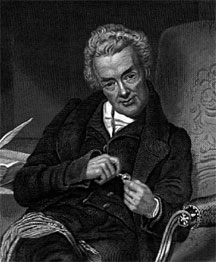« Sent to Enact the Good News, Part 2 | Home | Images of San Antonio, Texas »
Sent to Enact the Good News, Part 3
By Mark D. Roberts | Friday, September 7, 2007
Part 13 of series: The Mission of God and the Missional Church
Permalink for this post / Permalink for this series
 Until a few months ago, most people were unfamiliar with William Wilberforce. The recent movie Amazing Grace has changed that considerably. This film, starring Ioan Gruffudd as Wilberforce, narrates the first part of Wilberforce’s truly amazing, grace-filled and gracious life.
Until a few months ago, most people were unfamiliar with William Wilberforce. The recent movie Amazing Grace has changed that considerably. This film, starring Ioan Gruffudd as Wilberforce, narrates the first part of Wilberforce’s truly amazing, grace-filled and gracious life.
Born into wealth and privilege in 1759, Wilberforce was known in his early years only for his love of socializing and his several physical infirmities. He had no guiding purpose for his well-to-do yet meaningless existence. When he was elected to the British Parliament as a young man, he sought nothing more than his own fame.
But when a Christian friend shared the good news of Christ with him, Wilberforce realized the emptiness of his life. He considered withdrawing from politics altogether. But, as he trusted Christ for salvation on Easter Sunday, 1786, Wilberforce sensed a new zeal to serve the Lord within the sphere of government. Ultimately he seized upon the abolition of slavery as the focus of his Christian and political energies. Though discouraged by many Christian leaders because of the apparent impossibility of the mission, Wilberforce believed that God had sent him into politics to fight against the evils of slavery. (Photo to the right: The real William Wilberforce was not quite as good looking as Ioan Gruffudd.)
 In 1788 he introduced a measure in the British Parliament to end the slave trade, and was resoundingly defeated. Similar measures were defeated in 1791, 1792, 1793, 1797, 1798, 1799, 1804, and 1805. Finally, in 1807 Parliament voted to abolish the slave trade, though leaving the institution of slavery untouched. This is where the film Amazing Grace ended. But Wilberforce had much more to do.
In 1788 he introduced a measure in the British Parliament to end the slave trade, and was resoundingly defeated. Similar measures were defeated in 1791, 1792, 1793, 1797, 1798, 1799, 1804, and 1805. Finally, in 1807 Parliament voted to abolish the slave trade, though leaving the institution of slavery untouched. This is where the film Amazing Grace ended. But Wilberforce had much more to do.
For the next 26 years Wilberforce continued his crusade. Finally, on July 26, 1833, the emancipation of slaves was insured when a committee of the House of Commons ironed out the details of Wilberforce’s anti-slavery bill. Three days later, after 45 years of God-honoring effort, William Wilberforce died, leaving an unsurpassed legacy of Christian concern for justice. His efforts encouraged American evangelicals who worked tirelessly for the abolition of slavery in the United States.
Unfortunately, some Christians have driven a wedge between the proclamation of the good news and the enactment of that news. The 20th century witnessed debilitating arguments between proponents of “evangelism” and “social justice,” as if we had to choose between two activities that are both essential to our full mission as Christians. The Bible makes it abundantly clear that Christ died both to reconcile us to God and to bring reconciliation among people (Eph 2:1-18). What God has joined together, let no one put asunder!
Increasingly in our time, the unbiblical breach between proclamation and enactment of the gospel has been mended. Many well-known and respected Christian organizations combine evangelism with social action, offering the fullness of healing as a demonstration of the gospel. World Vision leads the world in caring for and empowering the poor. Habitat for Humanity builds homes for the homeless in the name of Christ. Prison Fellowship seeks to lead inmates to Christ, to improve their treatment in prison, to care for their families during their incarceration, and to help them become contributing members of society upon their release. Many churches invest their time, talent, and treasure in spreading the gospel and living the gospel through works of charity and justice.
You and I can enact the good news through our participation in some facet of Christ’s ministry. We might visit shut-in senior citizens, or feed the hungry at a homeless shelter, or pound nails with Habitat for Humanity. Moreover, we can show our world the truth of the gospel by loving everyone God’s brings into our path. When we love our Christian brothers and sisters in particular, the reality of the gospel can be seen in our fellowship. As Jesus said to His first followers, so he says now to us:
So now I am giving you a new commandment: Love each other. Just as I have loved you, you should love each other. Your love for one another will prove to the world that you are my disciples (John 13:34-35).
Topics: Mission |
2 Responses to “Sent to Enact the Good News, Part 3”
Comments
Thanks for your willingness to make a comment. Note: I do not moderate comments before they are posted, though they are automatically screened for profanities, spam, etc., and sometimes the screening program holds comments for moderation even though they're not offensive. I encourage open dialogue and serious disagreement, and am always willing to learn from my mistakes. I will not delete comments unless they are extraordinarily rude or irrelevant to the topic at hand. You do need to login in order to make a comment, because this cuts down on spam. You are free to use a nickname if you wish. Finally, I will eventually read all comments, but I don't have the time to respond to them on a consistent basis because I've got a few other demands on my time, like my "day job," my family, sleep, etc.
You must be logged in to post a comment.















September 7th, 2007 at 3:01 pm
From my left-wing, agnostic view, this emphasis by evangelical Christians on social service is encouraging, and frankly, exciting. I believe the long term solution to the anger and problems is the United States being the good guy, the helping hand once again in the world. (We of course need pragmatism, and the barrel of a gun unfortunately still has a lot of pragmatic uses in this dangerous world.)
But certainly from a secular side, I think there’s a lot of us eager to find ways where we can help troubled spots in the world, for example, Sudan/Darfur. I don’t think this can be accomplished by churches alone, and I don’t think it can be done by government alone in secular ideas like the Peace Corp or a Social Security program. But together, I bet on us.
If Christians emphasize emphasize the commandment to love each other, then we secular folk owe it to be working side by side with you with great ideals too—like that no matter who or where you are on this planet, you have the right to life, liberty, and the pursuit of happiness.
Great post, Pastor Roberts.
September 7th, 2007 at 3:39 pm
You know, Christians have abdicated a lot of good things by drawing away from them because of other people who are involved. Social justice issues, as you have rightly pointed out. And care for the environment, which seems like a thing that would be high on our list. But it isn’t, at least not in the evangelical world.